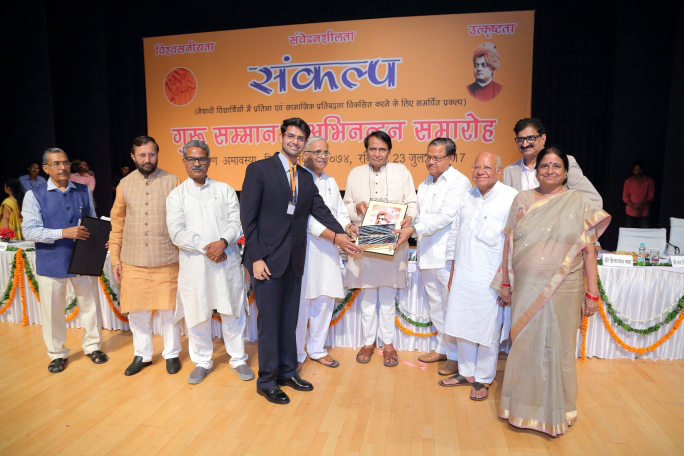Please Login To Continue
Assessment Of Indian Judiciary - How To Prepare (Polity Lessons for UPSC CSE)
Lesson 33 of 38 • 268 upvotes • 10:00mins

Aaditya Mishra
This lesson helps the viewers in understanding the things that they need to prepare from the topic. It helps by providing assessment of the “Beijing Statement of the Independence of Judiciary” which has been adopted by Indian judicial systems. It then talks about the type of questions one should look for while reading the relevant chapters from Laxmikant.
Right Approach To Understand The Indian Constitution for UPSC CSE/IAS Exam
38 lessons • 6h 22m
1
A New Approach To Reading Polity for UPSC CSE/IAS Exam
9:58mins
2
5-Step Strategy For Reading Polity for UPSC CSE/IAS Exam
10:00mins
3
Overview Of The Constitution for UPSC CSE/IAS Exam
10:00mins
4
Preamble Of The Indian Constitution for UPSC CSE/IAS Exam
10:00mins
5
Part I : The Union And Its Territories Article 1-4 for UPSC CSE/IAS Exam
10:00mins
6
Part II : Citizenship Of The Indian Constitution Article 5-11 for UPSC CSE/IAS Exam
10:00mins
7
Definition Of 'State' for UPSC CSE/IAS Exam - Part III : Fundamental Rights Article 12
8:55mins
8
Fundamental Rights Article 13 Laws Inconsistent With Fundamental Rights - Part III
10:00mins
9
Right To Equality Article 14 : Part 3
10:00mins
10
Right To Equality Article 14 (Continued): Part 3
10:32mins
11
Fundamental Rights Article 15 To Article 18 : Part 3
9:58mins
12
Fundamental Rights Article 16 To Article 18: Part 3
10:00mins
13
Fundamental Rights Article 19: Part 3
10:32mins
14
Fundamental Rights Article 20 - Protection In Respect Of Conviction For Offences: Part III
10:00mins
15
Fundamental Rights Article 21 - An Introduction: Part III
9:48mins
16
Fundamental Rights Article 21 - An Introduction - Part III (Hindi)
10:00mins
17
Fundamental Rights Article 21 - Supreme Court’s Interpretation In Gopalan Case Till National Emergency - Part III
10:00mins
18
Fundamental Rights Article 21 - Supreme Court’s Interpretation In Gopalan Case Till National Emergency: Part III (Hindi)
10:00mins
19
Fundamental Rights Article 21 - Maneka Gandhi Case And Its Expansion: Part III
10:31mins
20
Fundamental Rights Article 21 - Legal Position Of Euthanasia And Suicide: Part III
10:00mins
21
Fundamental Rights Article 22 - Protection Against Arrest & Detention: Part III
10:00mins
22
Fundamental Rights Article 22 - Does India Needs Preventive Detention Provisions: Part III
10:00mins
23
Fundamental Rights Article 23 & 24 - Right Against Exploitation: Part III
9:35mins
24
Fundamental Rights Article 23 & 24 - Bonded & Child Labour Issues (Part 1): Part III
10:30mins
25
Fundamental Rights Article 23 & 24 - Bonded & Child Labour Issues (Part2): Part III
10:00mins
26
Fundamental Rights Article 25 & 26: Part III
9:57mins
27
Fundamental Rights Article 27 & 28: Part III
10:00mins
28
Notions Of Secularism - European Countries Part 1 (Polity Lessons for UPSC CSE)
10:00mins
29
Notions Of Secularism - European Countries Part 2 (Polity Lessons for UPSC CSE)
10:00mins
30
Notions Of Secularism - USA And India (Polity Lessons for UPSC CSE)
10:32mins
31
Notions Of Indian Secularism - Sarv Dharma Sambhav Conception & Principled Distance Approach Model
10:00mins
32
Part III : Fundamental Rights Article 32 - Rights To Constitutional Remedies
10:00mins
33
Assessment Of Indian Judiciary - How To Prepare (Polity Lessons for UPSC CSE)
10:00mins
34
Assessment Of Indian Judiciary - Collegium System And Judicial Review
9:55mins
35
Assesement Of Indian Judiciary - Judicial Review In India (Polity Lessons for UPSC CSE)
10:00mins
36
Assessment Of Indian Judiciary - Comparison Of US And Indian SC & Judicial Activism (Polity Lessons for UPSC CSE)
10:32mins
37
Assessment Of Indian Judiciary - Judicial Restrain Against Activism (Polity Lessons for UPSC CSE)
10:30mins
38
Assesement Of Indian Judiciary - Score Card Of Indian Courts (Polity Lessons for UPSC CSE)
10:32mins